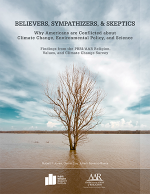
A new survey (PDF) from the Public Religion Research Institute hopes to help to explain, in the words of its report's subtitle, "Why Americans are Conflicted about Climate Change, Environmental Policy, and Science." Included in the survey was a series of questions probing beliefs about climate change and its causes. Asked "From what you've read and heard, do you believe there is solid evidence that the average temperature on earth has been getting warmer over the past few decades, or not?" 69% of respondents answered yes, 2% volunteered that there is some or mixed evidence, and 26% answered no, with 3% saying that they didn't know or refusing to answer.
The respondents who answered yes (including those who said that there is some or mixed evidence) were presented with "Climate change is caused mostly by human activity such as burning fossil fuels" and "Climate change is caused mostly by natural patterns in the earth's environment" and asked which came closer to their view. The first option was preferred by 65% of those respondents (that is, 46% of the entire pool of respondents) and the second option was preferred by 28% of those respondents (20% of the entire pool), while 6% of those respondents (4% of the entire pool) said that they didn't know or refused to answer.
The respondents who answered no were asked, "In just a few words, what is the main reason you believe that the average temperature [on] earth has NOT been getting warmer." The most popular answer, given by 33%, was "Weather hasn't changed/Weather is getting colder," followed by "Temperature varies naturally" (18%), "Insufficient proof/No scientific evidence/Conflicting evidence" (12%), "News reports and data on global warming are flawed/propaganda" (5%), "General personal observation and experience" (4%), "God is in control" (2%), "Other scientific explanation or evidence" (4%); 11% offered no reason or another explanation and 11% said that they didn't know or refused to answer.
Respondents were also asked, "From what you've heard or read, do scientists generally agree that the earth is getting warmer because of human activity, are scientists divided, or do scientists generally disagree that the earth is getting warmer because of human activity?" The result was that 48% of respondents thought that scientists agree, 28% thought that scientists are divided, and 17% thought that scientists disagree, with 7% of respondents saying that they didn't know or refusing to answer. In 2011, 40% of respondents thought that scientists agree, 37% thought that scientists are divided, and 15% thought that scientists disagree, with 8% of respondents saying that they didn't know or refusing to answer.
Describing the respondents who accepted human-caused climate change as Believers, those who accept climate change but regard it as natural as Sympathizers, and those who reject climate change as Skeptic, PPRI offered a few demographical data. Politically, "Democrats have a higher percentage of climate change Believers [i.e., 65%] within their ranks, while Republicans and Americans who identify with the Tea Party are more likely to be climate change Skeptics [46% and 53% are, respectively]." Religiously, "Only 27% of white evangelical Protestants are climate change Believers, while 29% are Sympathizers and nearly 4-in-10 (39%) are Skeptics."
According to the survey report, "Results of the survey were based on bilingual (Spanish and English) RDD telephone interviews conducted between September 18, 2014, and October 8, 2014, by professional interviewers under the direction of SSRS. Interviews were conducted among a random sample of 3,022 adults 18 years of age or older living in the United States (1,502 respondents were interviewed on a cell phone). ... The margin of error for the survey is +/- 2.8 percentage points at the 95% level of confidence. The design effect for the survey is 2.4. In addition to sampling error, surveys may also be subject to error or bias due to question wording, context and order effects."
